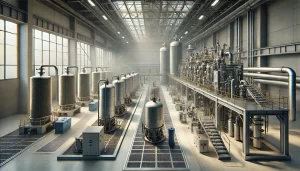
20
Nov
The Essential Guide to Oil and Diesel Purification Systems: Enhancing Equipment Performance and Longevity

In industries reliant on heavy machinery, engines, and hydraulic systems, oil and diesel purity play crucial roles in maintaining equipment health, minimizing maintenance, and extending component life. A buildup of contaminants in oil or diesel can lead to costly wear and tear, performance degradation, and increased downtime. To tackle these issues, oil and diesel purification systems offer an effective solution, enabling businesses to reduce operating costs, enhance efficiency, and lower environmental impact.
Why Oil and Diesel Purification Matters
Oil and diesel fuel are vital for the operation of a wide range of equipment, from industrial machines and hydraulic systems to vehicles and marine engines. However, impurities in these fluids, including water, particulates, and sludge, can severely impact performance. Even small particles, such as those down to 1-3 microns, can cause significant wear to sensitive components, while water can lead to corrosion, degradation of oil quality, and eventually, system failure.
In a typical setup without purification, contaminants enter oil and diesel in various ways: through air intake, condensation, or as a result of equipment operation. These contaminants degrade the quality of the oil or fuel, leading to frequent fluid changes, increased maintenance costs, and often premature equipment replacement.
Purification systems address this issue by maintaining oil and diesel cleanliness, enhancing fluid longevity, and allowing machinery to operate at optimal efficiency for longer periods. Such systems leverage a combination of filtration and dehydration processes to tackle contaminants, producing results that often exceed the cleanliness levels of new fluids.
Key Components of Oil and Diesel Purification Systems
Oil and diesel purification systems generally use a two-stage process to achieve high levels of fluid purity:
Trending Insights
Products Categories
- Filtration: The first stage is designed to remove solid contaminants, such as particles and sludge. High-quality filtration materials, often including natural fibers like cotton, are used to capture particles as small as 1-3 microns. This is crucial for maintaining the mechanical integrity of hydraulic systems, engines, and pumps, as fine particles can severely damage these components over time.
- Dehydration: The second stage focuses on removing water from the oil or diesel. Water contamination can occur in the form of free, emulsified, or dissolved water. Effective dehydration methods, such as flash evaporation, can eliminate up to 98% of water content, bringing levels down to as low as 100-200 parts per million (ppm). This reduction helps prevent corrosion and oxidation, which can damage internal surfaces and degrade oil quality.
Filtration Techniques: Capturing the Smallest Particles
Purification systems use specialized filters capable of capturing particles down to 1-3 microns in size, a range that standard filters typically cannot achieve. Natural fiber filters, especially those made from long-strand cotton, have proven highly effective in this role. The fibers trap particles without causing excessive pressure drops, ensuring smooth flow while achieving deep filtration. This fine level of filtration is instrumental in preventing abrasive particles from reaching critical machinery components, where they could cause wear and reduce equipment lifespan.
In addition to removing particulates, these filters also capture sludge, which can form as a result of chemical reactions within the oil, particularly under high temperatures and pressures. The system further prevents blockages and maintains the fluid’s flow properties by filtering out sludge.
Dehydration Methods: Keeping Fluids Water-Free
Water contamination poses a unique challenge, as it can exist in different forms—free, emulsified, and dissolved. Each form requires a different approach for effective removal. For instance, free water can be separated relatively easily, while emulsified and dissolved water often require more advanced processes.
One of the most efficient dehydration techniques is flash evaporation. This method involves heating the fluid under controlled conditions to vaporize and remove water content. It effectively reduces water levels in oil to 100-200 ppm, safeguarding against issues like corrosion and oxidation, which can otherwise reduce oil life and compromise equipment. These systems not only extend fluid life but also reduce the potential for rust and other types of chemical degradation within machinery.
Specialized Solutions for Oil and Diesel Purification Systems
In industries where equipment relies on clean hydraulic oils, lubricants, and diesel fuel, advanced purification systems are essential. These systems remove contaminants that degrade fluid quality and compromise equipment performance. Tailored for specific applications, oil and diesel purification systems enhance fluid longevity and reduce maintenance costs across various sectors.
Oil Purification Systems:
- Designed specifically for hydraulic and lubricating oils to remove both water and contaminants.
- Capable of extending oil life by 10-15 times compared to untreated options.
- Improve operational efficiency, reducing the need for frequent oil changes and lowering downtime.
Engine Oil Filters:
- Engineered to capture particles as small as 1-3 microns and remove water content from the oil.
- Extend engine oil lifespan three to five times, minimizing replacement frequency.
- Help decrease engine wear, supporting long-term equipment reliability and cost savings.
Diesel Purification Systems:
- Built to filter out up to 95% of particulates and 98% of water from diesel fuel.
- Ensure fuel quality remains high, promoting optimal engine performance and longevity.
- Lower operational expenses, reducing the likelihood of fuel-related engine issues and minimizing maintenance needs.
The Benefits of Oil and Diesel Purification
Purification systems provide several advantages for industries reliant on hydraulic oils, lubricating oils, and diesel fuel. By continuously filtering and dehydrating these fluids, businesses can achieve:
- Extended Fluid Life: With effective purification, oil and diesel can last up to 10-15 times longer than untreated fluids. This results in fewer oil changes, reduced oil consumption, and lower costs over time.
- Reduced Maintenance Costs: Cleaner fluids lead to fewer equipment breakdowns, less wear on components, and longer-lasting parts. As a result, companies spend less on repairs, replacements, and labor.
- Improved Equipment Performance: When oil and diesel are free from contaminants, machinery can operate more efficiently, reducing the energy required and enhancing overall performance.
- Lower Environmental Impact: Purification systems contribute to sustainability by minimizing the disposal of used oils and diesel, reducing the need for new fluid production, and decreasing waste.
Applications of Purification Systems Across Industries
Oil and diesel purification systems have diverse applications across industries, including manufacturing, transportation, mining, marine, and power generation.
- Manufacturing: In manufacturing environments, hydraulic oils power machinery, and lubricants keep parts moving smoothly. With purification systems in place, these fluids can perform at optimal levels, reducing machine downtime and improving productivity.
- Transportation: Diesel engines are common in trucks, trains, and ships, where fuel purity is essential for performance and longevity. By removing particles and water from diesel, purification systems help reduce emissions, enhance fuel economy, and extend engine life.
- Mining and Heavy Equipment: Mining equipment operates in dusty, harsh conditions that can quickly contaminate oil and fuel. Purification systems protect engines and hydraulic systems from abrasive particles, extending component life and reducing maintenance needs in these challenging environments.
- Marine Industry: Ships and offshore rigs rely heavily on diesel and lubricating oils to function effectively. Purification systems prevent fuel degradation and reduce the need for fluid changes, which is crucial for marine vessels that often operate for extended periods without access to maintenance facilities.
- Power Generation: Power plants use heavy-duty equipment, including turbines and compressors, which require clean oil for efficient operation. By implementing purification systems, power generation facilities can achieve greater reliability, reduced downtime, and more consistent performance.
The Environmental Aspect: Reducing Waste and Promoting Sustainability
With the increasing emphasis on sustainability, oil and diesel purification systems play an essential role in reducing waste and promoting environmental responsibility. By extending the life of fluids, these systems reduce the demand for new oil production and minimize waste disposal. Fewer oil changes mean less waste oil that needs to be managed, incinerated, or disposed of, which benefits the environment and aligns with sustainability goals across industries.
Furthermore, the reduction in particulate emissions from cleaner diesel fuel directly supports environmental initiatives to reduce air pollution and greenhouse gas emissions. For companies aiming to achieve sustainability targets, investing in oil and diesel purification technology can be a practical step toward cleaner and greener operations.
In Summary
Oil and diesel purification systems are indispensable for industries that rely on heavy machinery and equipment. From capturing fine particles to removing water, these purification processes extend fluid life, prevent wear, and promote cleaner, more sustainable practices.
In a world where equipment performance and environmental responsibility go hand in hand, oil and diesel purification systems offer a powerful solution. They ensure that businesses can continue to operate smoothly, meet regulatory standards, and achieve sustainability goals, all while reducing costs and enhancing equipment longevity.
Delrey Partners provide a range of high-quality oil filtration parts to keep your engines and machinery running at peak performance.




